Posts Tagged ‘Carles Torner’
PEN Journey 46: Wrapping Up
PEN International celebrates its Centenary in 2021. I’ve been active in PEN for more than 30 years in various positions and now as an International Vice President Emeritus. With memories stirring and file drawers of documents and correspondence bulging, I am a bit of a walking archive and have been asked by PEN International to write down memories. I hope this personal PEN journey will be of interest.
I finished my term as International Secretary of PEN July 2007 at PEN’s 73rd World Congress in Dakar, Senegal. I handed over the responsibility to my longtime colleague Eugene Schoulgin (Norwegian PEN) who would continue to work with the Board, the Executive Director Caroline McCormick, new Treasurer Eric Lax and President Jiří Gruša. We had executed many changes in the last three years, and those who had been involved were continuing and active both in the international leadership and in the PEN centers.
Before the Congress, the staff and PEN members gave me a farewell party at PEN International’s relatively new London headquarters on High Holborn. PEN is about people, and I’d been fortunate to work over many decades with dozens of talented writers who were also competent in organizational work, friends from around the globe who remain friends today.
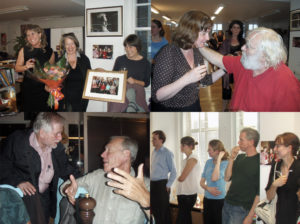
PEN International Farewell gathering in London 2007 with friends and staff, including Caroline McCormick, Joanne Leedom-Ackerman, Jane Spender, Sara Whyatt, Moris Farhi, Peter Firkin, Eugene Schoulgin, Frank Geary, Emily Bromfield, Mitch Albert, Mandy Garner.
As a Vice President, I would continue to work, write appeal letters to governments for the Writers in Prison Committee (WiPC)’s RAN (Rapid Action Network) cases, speak when asked and hold meetings in Washington when asked, but I could return to being a writer. American PEN’s Executive Director Michael Roberts asked me to join American PEN’s board. I demurred and said I needed a break, but he and others urged me so in 2008 I joined the board of PEN America but worked at a far less intense pace for the next six years. When American PEN’s new Executive Director Suzanne Nossel came on, I was asked to extend for an additional year as a Vice President while she oriented to PEN’s international work. It is difficult to step away from PEN though most who are engaged find they must for a time, though not too far away.
As I left the historic Senegal Congress that July 2007, I boarded a plane and flew out over the Atlantic to Italy where I met up with my husband by a lake in one of our favorite spots for a vacation. He had patiently waited those three years as I spent 10-15 days a month on the road. In the first week without PEN’s emails and phone calls and conferences, we talked; I wrote, and I read four books in six days.
Back home I soon realized I needed to join the 21st century as a writer. At PEN we had begun to use some tools of social media in publicizing cases of writers under threat, but I hadn’t engaged personally. I remember sitting with a group of women writers in Washington, DC, many younger than me, who were talking about their websites and blogs and Twitter, and Facebook. In 2007 writers having URLs, Twitter handles, Facebook pages was relatively new. Twitter had only launched the year before, and though blogs had been around for a few years, I had never written one. Facebook seemed an odd medium, also only a few years old. I was of the “private” generation; we were not prone to sharing our activities and feelings on a “social” platform. Those of us who’d been journalists were used to having to condense stories, but never to 140 characters which Twitter demanded. We were in a new communications age, and I needed to understand and at least to put a toe in the water, even if I didn’t jump fully in.
Encouraged by friends and agent, I set up a website. The developer urged me to blog. I didn’t want to blog, I explained. I wanted to write fiction and occasional journalism, but I agreed to post a blog once a month. I have done so for over ten years now. Often when I considered what was worth writing about each month, I found myself reflecting on work with PEN. When asked to write about PEN’s history as I’d witnessed it in anticipation of the Centennial, I reasoned I could post twice a month. That seemed a reasonable way to get through PEN’s history year by year. A serial blog. I have sped up the pace since Covid locked us all into our homes and travel has halted. I have now come to an end of this particular PEN Journey though I will write an introduction. I will also reference links to those blog posts I wrote after 2007 when I continued to work with PEN.
In this final post, I want to review a few areas of PEN International I feel I haven’t explored sufficiently, and I want to give a quick view forward of what and who came next.
In Journey’s 7, 8, 22, 25, 26, I touched on the work of the PEN Emergency Fund. I want to highlight that here. Founded in 1971 by Dutch Writer A. (Bob) den Doolaard who had an active role with PEN International, the PEN Emergency Fund fulfilled a missing link in PEN’s work. Doolaard noted that PEN had no mechanism to grant material aid to writers, especially those under threat who had to flee their countries so he and Dutch PEN set up the aid fund based in the Netherlands, operated under Dutch law. The PEN Emergency Fund gives a one-time grant to writers in dire circumstances and is able to act quickly. Over the years PEN’s Emergency Fund has provided rapid support for writers on every continent, especially those in Eastern Europe during the Communist era and those in the Balkans War in the 1990s and also to persecuted writers in Asia, Africa and Latin America. Every year dozens of writers have been helped with grants that have bridged to longer term answers. The Fund operates in close collaboration with PEN International whose professionals furnish the Fund with information and with the PEN centers and members who have contributed to the Fund. I’ve had the privilege of serving on the PEN Emergency Fund Advisory Board for a number of years.
Prizes: As a literary organization, PEN through its centers awards numbers of literary awards, but only a few literary prizes have been awarded by PEN International. Over the years the idea of a PEN International Prize for Literature or even for Peace has arisen. When I first took on the position of International Secretary, we were approached by a donor offering to give PEN $100,000 for the PEN International Prize for Peace. Well-meaning though the donor was, it quickly became clear that PEN International could not accept. The donor already had his first winner in mind—Bono. We explained that any prize would have to be independently judged with established criteria and nominating processes, and in order for PEN to give an annual prize, we would need to have a substantial financial commitment in an account to assure we could afford the prize each year as well as the cost of the judging and ceremony. We named the figure. The discussions broke off though the donor, I think, did find another way to give his prize though not through PEN.
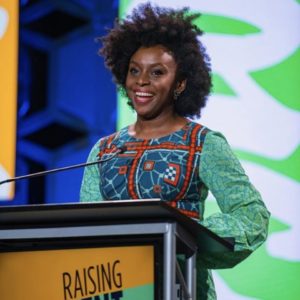
Chimamanda Adichie, PEN David T. Wong International Short Story Prize winner.
The biennial PEN David T. Wong International Short Story Prize did come into being for a time, with a much more modest monetary award for a new writer, open to nominations by all PEN Centers and run by International PEN Foundation’s Gilly Vincent, who later became General Secretary of English PEN. Gilly was a pro and lined up well-qualified writers as judges. The nominations came in from PEN Centers around the world and the winner was often celebrated at PEN’s Congress. One of the first winners for 2002-2003 was a young Nigerian writer Chimamanda Adichie, who won for her short story “One Half of the Yellow Sun,” submitted by her local PEN Center USA West. The story went on to become the celebrated novel by the same name, and she went on to win wide international acclaim for that and other books. The PEN David T. Wong Prize was one of the first international recognition of her as a writer. The judges for 2003 were William Trevor, Michele Roberts and J.M. Coetzee who won the Nobel Prize for Literature later that year. The 2001 prize had been won by Rachel Seifert, who went on to have her first novel short-listed for Booker Prize.
PEN International’s Writers in Prison Committee, the PEN Emergency Fund and Oxfam Novib each year do give the Oxfam Novib/PEN International Free Expression Award to writers who work for freedom of expression in the face of persecution. The award is given to writers and journalists committed to free speech despite the danger to their own lives.
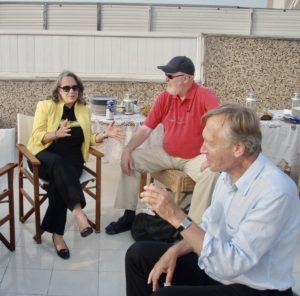
Turkey visit—on the roof with Joanne Leedom-Ackerman, Carl Morten and Eugene Schoulgin (Norwegian PEN)
Many other literary awards and literary festivals are hosted by PEN’s centers around the world. I had the pleasure of visiting a number of those, including in Croatia and in Turkey, hosted by the PEN centers.
There are many aspects of PEN’s work I’ve touched on but not explored fully such as the formation of a PEN center, which technically can occur when 20 reputable writers get together and petition the International office. There is a limit of five centers per country; most countries have fewer, and many countries have only one center. The rationale for additional centers has been to reflect linguistic diversity in a country. For instance, Switzerland has French, German, Italian, and Esperanto centers, or to facilitate participation when the land mass is large. The U.S. used to have two centers, one based in New York and one in Los Angeles, but in the past years, the two centers have merged into one PEN America. In Canada where there is both large land mass and diverse languages PEN has two centers—PEN Canada based in Toronto essentially uses English as the primary language and Quebecois PEN uses French. In some countries there are many, many languages as in India, which also has a large landscape and has the All-India Center in Bombay and the PEN Delhi Center. The rationale depends largely on the ambition and needs of the writers on the ground. Often a center will form branches within a country to provide the services and community for writers.
One document I did not include in an earlier post was the rationale from PEN International Vice President and Nobel Laureate Nadine Gordimer regarding the formation and naming of centers as related to a petition from writers in South Africa to form an Afrikaans Center. I’ve copied it here because it was from one of PEN’s eminent and active members and because it articulated ongoing questions in PEN. Gordimer’s argument did not prevail at the Berlin Congress in 2006 where an Afrikaans Center, not a Pretoria Center, was voted in though the center is based in Pretoria. The reasoning nonetheless is worth considering. The dynamics are ongoing in a number of countries and will likely continue as new centers are added or removed when they grow inactive.
Nadine Gordimer: “Let me make it clear. My objection to the formation of an Afrikaans language PEN club has no significance whatever of any kind of prejudice against my brother and sister South Africans, who are Afrikaans speakers and writers just as I am an English-speaking writer. We have eleven languages in our country. I should have exactly the same objection to the formation of an isiZulu or isiXhosa Club. We cannot have separate-but-equal (shades of apartheid) Clubs for every language, even though most of which have the strong linguistic claim of ante-dating colonially imported English and colonially created Afrikaans. I support a vigorous and linguistically open South African PEN Club, to have local representation in each region, with membership actively pursued among writers in whatever South African languages are theirs. Only such a chapter could have the strength to fulfil our needs…Historic-culturally determined circumstances give us both the necessity to overcome them and the fine opportunity to make full use of them, for our writers and our poly-literature.”
PEN is a breathing, living organization whose main body has been working around the world for a century with new members and centers joining every year as other centers at times have fallen dormant or closed. It is a fellowship of writers, of citizens in civil society holding watch over freedom of expression, linguistic diversity, over literature, and over the imagination and art by which societies flourish. Particular issues and threats change according to the times. PEN declares itself an apolitical organization, yet it is an organization whose central principle and commitment to freedom of expression sets it in the fray of politics since an early warning of a society descending into authoritarianism is the arrest of its writers and the closing down of space for free expression.
Changes in PEN leadership internationally and in centers effect the organization, but the Charter holds the whole body together. The leadership of PEN International used to reside in the President, the International Secretary and the Treasurer as the Executive, which represented the Centers’ Assembly of Delegates between two annual Congresses. The narrative of this PEN Journey has shown the change in the organization and its governance as it has grown and the world in which it operated has altered. PEN International has more than doubled in size over the last three decades to 155 centers in more than 100 countries. It now holds only one Congress a year, and the leadership is a partnership among the President, the International Secretary, the Treasurer, and an elected 7-member Board representing the Centers. Work is facilitated by an Executive Director, a position first hired in 2005, who heads the staff. Depending on the skills and experience and personality of each, the dynamic changes. In my term, I tended to be hands-on as an International Secretary. The President Jiří Gruša with whom I served was engaged as the Director of a Diplomatic Academy and had not been very active in PEN before he took the role of President. I would check in with Jiří before each monthly board meeting, explain the agenda as I saw it, ask if he wanted to add or change any items and if he wanted to attend. Jiří, a former prisoner of conscience, had lived the principles of PEN, understood them and with experience, knowledge and wit was an authentic voice on the international stage. But the day-to-day decision-making and running of the organization he largely left to me and then with the first Executive Director, the Board and the staff.
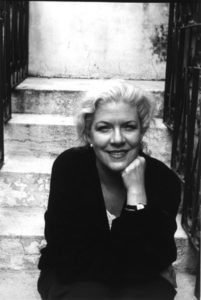
Jennifer Clement, PEN International President 2015-2021
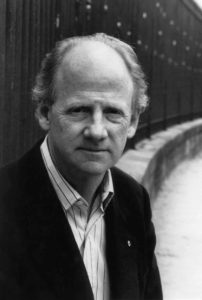
John Ralson Saul, PEN International President 2009-2015
Jiří’s successor John Ralston Saul, former President of PEN Canada, had been a long time PEN member, active in the organization with experience in governing. He took on a much more active role as President, working with International Secretary Eugene Schoulgin (Norwegian PEN) and then International Secretary Hori Takeaki (Japan PEN). John traveled the globe visiting PEN centers and government officials and taking on the issues of his period. After John, PEN elected its first woman President Jennifer Clement, former President of PEN Mexico, who took on the work, along with a special focus on the issues of women globally. She spearheaded, along with PEN’s Women Writers Committee, a Women’s Manifesto and later an Imagination Manifesto and will serve until the end of the Centenary Congress in England in 2021. Kätlin Kaldmaa (Estonian PEN) has served as International Secretary during this time along with longtime PEN member Carles Torner as Executive Director.
Unfortunately over the years as PEN’s website has been upgraded, the content has not always been exported so many of the documents and speeches and records have not followed into the digital universe. The narrative is carried in paper files which overflow in my basement and even more in PEN’s and in the memories of PEN members. My own PEN Journey has been an effort to record some of the history and offer a continuity of narrative during a particular period, through the eyes of one PEN member who has had the privilege and pleasure of standing up close for part of that history. I’ve tried to render the direction and actions. The flaws, the missteps of people, including myself, I’ve also witnessed but have largely left to the side in this narrative. My purpose has not been to be a critic nor a hagiographer, nor a novelist, but a reporter, recording the actions and the journey with a touch of personal memoir.
I will leave this journey by quoting from PEN’s Democracy of the Imagination Manifesto, unanimously passed at the 85th PEN World Congress in Manila, Philippines, October 2019:
The opening of the PEN International Charter states that literature knows no frontiers. This speaks to both real and, no less importantly, those imagined.
PEN stands against notions of national and cultural purity that seek to stop people from listening, reading and learning from each other. One of the most treacherous forms of censorship is self-censorship —where walls are built around the imagination and often raised from fear of attack.
PEN believes the imagination allows writers and readers to transcend their own place in the world to include the ideas of others. This place for some writers has been prison where the imagination has meant interior freedom and, often, survival.
The imagination is the territory of all discovery as ideas come into being as one creates them. It is often in the confluence of contradiction, found in metaphor and simile, where the most profound human experiences reside.
For almost 100 years PEN has stood for freedom of expression. PEN also stands for, and believes in, the freedom of the empathetic imagination while recognizing that many have not been the ones to tell their own stories.
PEN INTERNATIONAL UPHOLDS THE FOLLOWING PRINCIPLES:
- We defend the imagination and believe it to be as free as dreams.
- We recognize and seek to counter the limits faced by so many in telling their own stories.
- We believe the imagination accesses all human experience, and reject restrictions of time, place, or origin.
- We know attempts to control the imagination may lead to xenophobia, hatred and division.
- Literature crosses all real and imagined frontiers and is always in the realm of the universal.
Next and final installment of PEN Journey: Introduction—the Curtain Rises
Links below are to blog posts mentioning PEN after 2007. I was not writing official reports of Congresses or WiPC conferences or other events, but reflecting on PEN’s work, cases and the impact of ideas in my own monthly posts, some of which I used in writing this PEN Journey:
The Journey of Liu Xiaobo: From Dark Horse to Nobel Laureate
March 31, 2020
Arc of History Bending Toward Justice?
March 20, 2019
Gathering in Istanbul for Freedom of Expression
May 23, 2018
Women’s Voices Rising (Women’s Manifesto)
February 28, 2018
Liu Xiaobo: On the Front Line of Ideas
December 7, 2017
Reclaiming Truth In Times Of Propaganda (83rd PEN Congress in Lviv, Ukraine)
September 28, 2017
“Finding Room for Common Ground: No Enemies, No Hatred”
September 8, 2017
In Turkey, a show of solidarity with writers behind bars (PEN Turkey Mission)
February 3, 2017
Power on Loan
January 23, 2017
Hope for Songs Not Prison in 2017
December 27, 2016
Building Literary Bridges: Past and Present (82nd PEN Congress in Ourense, Spain)
October 3, 2016
Call for Help inside Iran’s Evin Prison
May 23, 2016
Spring and Release
March 18, 2016
View on the Bosporus: Rights in Retreat
January 29, 2016
Democracy in Africa: Who Can Chat with Kabila?
November 30, 2015
Life instead of Death…Rationality instead of Ignorance (81st PEN Congress in Quebec, Canada)
October 23, 2015
What Are You Not Reading This Summer? (WiPC Conference in Amsterdam)
June 11, 2015
Times and Tides
November 14, 2014
PEN on the Plains of Central Asia (80th PEN Congress in Bishkek, Kyrgyzstan)
October 7, 2014
Poets, Pardons and Ramadan
August 2, 2014
Women’s Progress: The Power of a Bridge…and a Double Yellow Line
March 12, 2014
Qatar: A Poet in a Desert Cell
November 1, 2013
The Last Colony?
October 15, 2013
Parallel Universe in a Glassed Concert Hall in Iceland (79th PEN Congress in Reykjavik, Iceland)
September 16, 2013
Living In and Beyond History (WiPC Conference in Krakow, Poland)
May 20, 2013
Two Voices Behind the Iron Doors
April 8, 2013
North Korean Writers in a Land of the Rising Sun (78th PEN Congress in Gyeongju, South Korea)
September 15, 2012
facebook or not?
June 28, 2012
Voices Around the World
January 30, 2012
Bridge Over the Bosporus: Citizenship on the Rise (77th PEN Congress, Belgrade, Serbia mentioned)
September 28, 2011
Tourist in Beijing: A Dance with the Censor
July 29, 2011
Ice Flows: Freedom of Expression
January 29, 2011
In the Woods: On History’s Doorstep
December 22, 2010
Full Moon Over Tokyo (76th PEN Congress in Tokyo, Japan)
September 30, 2010
Introducing Isabel Allende
May 21, 2010
“Because Writers Speak Their Minds”–2
March 31, 2010
“Because Writers Speak Their Minds”
February 24, 2010
Haitian Farewell
January 18, 2010
Yellow Geranium in a Tin Can
October 27, 2009
China at 60–Fate of Liu Xiaobo?
September 30, 2009
A Time of Hopening (WiPC Conference in Oslo, Norway)
June 24, 2009
“There Will Still Be Light” *
April 30, 2009
The Intensifying Battle Over Internet Freedom
February 24, 2009
Charter 08: Decade of the Citizen
December 30, 2008
China from the 22nd Floor (Hong Kong Conference)
May 28, 2008
OLYMPIC RELAY– A POEM ON THE MOVE
April 21, 2008
Words That Matter
March 4, 2008
PEN Journey 34: Diyarbakir and Beyond—Finding Byways for Peace
PEN International celebrates its Centenary in 2021. I’ve been active in PEN for more than 30 years in various positions and now as an International Vice President Emeritus. With memories stirring and file drawers of documents and correspondence bulging, I am a bit of a walking archive and have been asked by PEN International to write down memories. I hope this personal PEN journey will be of interest.
PEN has always been about building bridges, finding the byways of fellowship among writers whose currency is language and imagination and whose hope is that even with radically different histories and backgrounds, writers might find a way to sit down across a table from each other and share stories and listen to each other and thereby have a beneficent influence on the way they and their societies see themselves and others.
It is an idealistic goal that has been battered in PEN’s hundred year history, and yet the organization continues; the dialogues continue, and writers from over 100 countries continue to meet and talk, even from countries whose governments have not found peace in decades. There have been moments of seeing that optimism realized, at least for a time, and also seeing it smashed.
The next section of these PEN Journeys covering the years 2004 (PEN Journey 33) through 2007 (August) will focus on my years as International Secretary of PEN International. I will travel through events chronologically, the number of events increasing considerably as the role demanded. I will try to knit these together as we continually try to do as an organization.
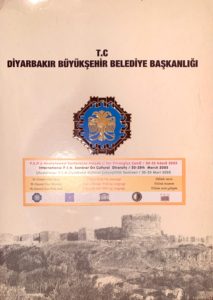
International PEN Seminar on Cultural Diversity in Diyarbakir, Turkey, March 2005
In January, 2005 we held our first board meeting of the year in Vienna where PEN President Jiří Gruša had recently taken up the position as Director of the Diplomatic Academy of Vienna which hosted us. The formal board meeting itself took place in the basement of the hotel restaurant where we were staying. Around the table in the cozy space where we sat on chairs and on a long booth was PEN’s diverse board from Algeria, Colombia, France, USA, Czech Republic, Denmark, Finland, Croatia, Australia, Norway and Japan. The search for an executive director, the new financial and employment systems going into place in the office, an upcoming meeting in Stavanger, Norway with the old Cities of Asylum Network, and an upcoming meeting in Diyarbakir, Turkey with Kurdish and Turkish PEN—all populated the agenda as did the omnipresent discussions on fundraising.
For me, the imminent departure of my Marine son from the combat zone in Iraq hovered in the corner of my mind. We were staying at a pension hotel with small rooms—single bed, dresser and nightstand; I could almost touch the walls on both sides. Outside it was snowing. I’d come to Vienna unprepared for the snow and had bought at a sale a large puffy yellow coat that now draped across the bed for warmth. At night in the dark as I fell asleep, I thought about my son and one night dreamed a desperate dream. Then the phone rang; it was 1:30 in the morning. My husband’s voice woke me. “Wheels are up!” he declared. “They are on their way home!” I still remember the moment, lying there in the dark, snow glistening in the light through the small window and feeling as though the walls had suddenly expanded and a weight lifted that I hadn’t been fully aware I was carrying. The memory…the snow, the Cathedral we passed each day in the square and at dusk in the evening, the puffy yellow coat…
I was wearing that same coat as snow fell later that month in Washington, DC the day my son finally pulled into our driveway. I was sitting on the front porch swing in the snow waiting for him, thinking about the hotel room in the dark, the restaurant basement where we helped craft a conference for writers from the hostile parties in Turkey and another to find sanctuary for writers fleeing oppression—all these memories are wrapped together in a moment of return and of the spirit lifting and life opening a corridor to walk down.
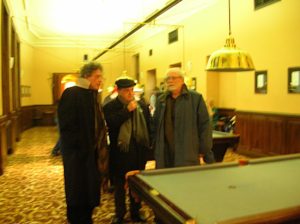
Czech PEN 80th Anniversary in Louvre Cafe where PEN members met in 1925. L to R: Playwright Tom Stoppard, PEN Int’l President Jiří Gruša, Czech PEN President Jiří Stránský.
The next meeting I attended that winter on February 15, 2005 celebrated the 80-year anniversary of Czech PEN. In Prague Jiří and I toasted the endurance of his PEN Center which had been founded by Karel Čapek and 37 Czech writers on that day in 1925. Czech PEN had survived the Second World War, the Cold War, the Soviet occupation and finally the liberation. Former prisoner, playwright and PEN member Václav Havel had become President of the country and his good friend and also prisoner Jiří Gruša was now President of International PEN. Under the auspices of the Minister of Culture, we met with Havel and playwright Tom Stoppard, himself Czech, and Jiří Stránský, President of Czech PEN at the Louvre Café where the original PEN gathering had taken place. Later, the Mayor of Prague hosted a reception with Czech PEN members in the Old Town Hall where he opened an exhibition celebrating “Eighty Years of the Czech PEN Club.”
The following week Writers in Prison Director (WIPC) Sara Whyatt and I traveled to the city of Stavanger, Norway which sat on the sea with a harbor and ships at dock. The Stavanger meeting brought together PEN and members of the now disbanded International Parliament of Writers, an organization founded after the fatwa against Salman Rushdie. The Parliament of Writers had developed a program to house writers in cities of asylum, but the Parliament of Writers no longer functioned. Many of the cities, however, still wanted to continue their hospitality for writers at risk. Stavanger itself hosted writers, including poet and novelist Chenjerai Hove, who’d been president of Zimbabwe PEN until he’d had to flee the government of Robert Mugabe. Hove was a fellow at the House of Culture in Stavanger until he passed away in 2015.
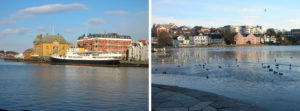
Stavanger, Norway, February, 2005 setting for birth of International Cities of Refuge Network (ICORN)
Helge Lunde, director of the Stavanger International Festival of Literature and Freedom of Speech convened PEN, representatives from the old Parliament of Writers and representatives from some of the cities that wanted to continue the program. In a several day meeting, the outlines of what would become the International Cities of Refuge Network (ICORN) were laid down with PEN as the vetting organization for applications and also a source of hospitality when writers arrived in their new temporary homes. ICORN remains active today in partnership with PEN in over 70 cities which promote and protect freedom of expression and host writers and artists at risk by providing housing, an income, literary arenas, scholarships and grants. PEN’s Writers in Prison Committee and ICORN regularly hold biennial meetings together.
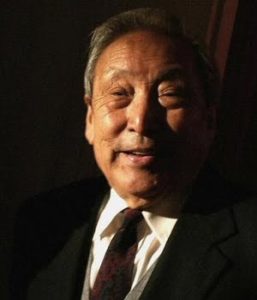
Writer Liu Binyan, a founder and first President, Independent Chinese PEN Center
The following weekend at Princeton University the relatively new Independent Chinese PEN Center (ICPC), founded in 2001, honored Liu Binyan, one of its founders and first President. ICPC’s members live both in China and abroad. The PEN Center gave them the ability to talk with each other and hold programs together, often in Hong Kong. Because of his writing and criticism of the Chinese Communist Party, especially after Tiananmen Square, Liu Binyan had not been allowed to return to China after an academic stay in the U.S. Though he never saw China again, in the U.S. he wrote and worked as Director of Princeton University’s China Initiative. (Nobel Laureate Liu Xiaobo was also a founder of ICPC and its second president.) At the dinner at the Princeton Faculty Club, ICPC members and China scholars presented Liu Binyan the book Living in Exile, written by distinguished essayists in China and abroad and dedicated to Liu who had spent considerable time in detention and in and out of labor camps. Later that year Liu Binyan passed away at his home in New Jersey.
In March “The International PEN Diyarbakir Seminar on Cultural Diversity” convened the largest and most ambitious conference that quarter in the primarily Kurdish southeast of Turkey. For years the Writers in Prison Committee had focused on cases in this dangerous region where fighting between the Kurdistan Workers Party (PKK) and the Turkish military had resulted in multiple imprisonments and killings. However, a rapprochement appeared to be expanding between the government and Kurdish citizens. In this space, PEN International had been working with Kurdish PEN and Turkish PEN to prepare this historic meeting of the two centers, along with PEN’s leadership of the Translation and Linguistic Rights Committee (TLRC). For the first time Kurdish writers and Turkish writers would speak side by side from the same stage in Kurdish and Turkish with translations of each language.
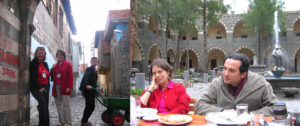
Diyarbakir, Turkey, March 2005. L to R: Joanne Leedom-Ackerman (PEN International Secretary), Jane Spender (PEN International Program Director), Carles Torner (Vice Chair Translation and Linguistic Rights Committee).
My predecessor as International Secretary Terry Carlbom had been instrumental in the planning, and we all agreed he should continue as coordinator of the seminar. Seventy delegates from a dozen countries gathered in the ancient city of Diyarbakir/Ahmed for five days. Diyarbakir dated back at least 5000 years, one of the oldest cities in the ancient land of Mesopotamia between the Tigris and Euphrates Rivers. Later it was dominated by Persia and by Alexander the Great. Because of its strategic position, Diyarbakir’s sovereignty changed many times, was part of the Roman empire, later conquered by the Arabs in 639, by Tamerlane in 1394; the Ottomans conquered in 1515. Diyarbakir continued through cycles of battles for control.
Old Diyarbakir was a standard Roman town circled by a wall, the stones of which still stood. The black basalt wall was said to be second only to the Great Wall of China. Within the walls a labyrinth of cobbled streets and alleyways unfolded, leading to towers where we could see the rivers and gardens and the city’s mosques and street life below, where caravan travelers used to stop on the silk road.
Before the conference began, PEN International Program Director Jane Spender and I explored the twisting paths and shared black tea in a central plaza with Carles Torner, vice chair of the Translation and Linguistic Rights Committee. As an American whose national history extended back barely 400 years, this accumulation of history in the streets and walls and buildings was mind-bending. In stones, in ideas…where did history reside and how did it evolve?
On the first evening Diyarbakir’s Lord Mayor Osman Baydemir greeted us at the Town Hall for a Newroz (New Year’s) reception. I thanked him on behalf of PEN for all he and the city had done to support this seminar. “It is a treat for us to visit one of the world’s oldest cities, with a history that could occupy the imagination of a community of writers like us for years to come,” I said. “Central to the Charter and ethos of PEN is a celebration of the universal which binds us as human beings and of the diversity which distinguishes each individual—the specific history, language and culture. It is our challenge and our aspiration as writers and members of PEN to provide the forums where cultures don’t clash but communicate. That is what we hope to do here in Diyarbakir.”
The first full day of the seminar we spent at the Newroz Festival. Our delegation was seated in an honored place in the bleachers which turned out to be behind the mother of Abdullah Öcalan, one of the founders and leaders of the PKK who was currently in prison. On the grounds in front of us spread thousands/ hundreds of thousands—some said a million people—celebrating the Kurdish new year, a time that coincides with the March equinox. Terry Carlbom and I were soon escorted to the main stage where we stood looking out over a sea of people as far as we could see, many in colorful local dress. Because PEN is specifically a nonpartisan/nonpolitical organization, we felt some ambivalence at the appearance of being swept into the Kurdish cause; on the other hand, the experience was one I won’t forget. The day was celebratory without violence. If there were political speeches, they were not translated for us, and we were accompanied by our Turkish colleagues who also attended.
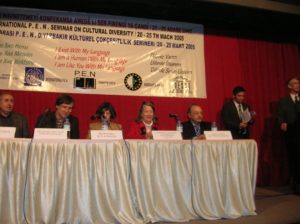
PEN Diyarbakir Conference on Cultural Diversity, 2005. L to R: Mehmed Uzun and Dr. Zaradachet Hajo (Kurdish PEN), Kata Kulavkova, (Chair, PEN Translation and Linguistic Rights Committee), Joanne Leedom-Ackerman, (PEN International Secretary), and Üstün Akmen, Turkish PEN
That evening in opening the conference, I noted, “In Diyarbakir/Ahmed this week we’ve come together to celebrate cultural diversity and explore the translation of literature from one language to another, especially to and from smaller languages. The seminars will focus on cultural diversity and dialogue, cultural diversity and peace, and language, and translation and the future. This progression implies that as one communicates and shares and translates, understanding may result, peace may become more likely and the future more secure.”
The official program began with the Lord Mayor and the President of Kurdish PEN Dr. Zaradachet Hajo and the President of Turkish PEN Mr. Üstün Akmen and a keynote speech by Kurdish author Mehmed Uzun. The following evening Turkish writer Murathan Mungan delivered an introductory address to a public gathering.
At the conference itself Kurdish and Turkish writers, poets, publishers and translators shared history and literature across their linguistic borders. Through discussion and readings and performances, they addressed the importance of cultural diversity as a value in a culture of peace.
Renowned Turkish/Kurdish novelist Yaşar Kemal, former president of Turkish PEN, had been invited but was ill and sent a message instead. He noted that the world was going through a difficult period and was faced with terrible destruction. He asked, “What makes human beings? Love, compassion, peace, friendship…Human beings are the only creative beings in the world.” Local cultures are being destroyed and with that is the destruction of languages and art and values, he said. In life and death we have to stand against a terrible destructive force in favor of local and national culture. “I believe your meeting will be successful,” he predicted.
Kata Kulavkova, Chair of the Translation and Linguistic Rights Committee emphasized the importance of the capacity to imagine, the importance of cultural memory and openness to dialogue. “Europe needs all identities, including Kurdish identities,” she said, noting that every culture is the center of the world for itself. “Turkish and Kurdish culture depend on each other to promote Turkish/Kurdish universal culture.”
Hüseyin Dozen of Kurdish PEN noted that literary translation helps a language to flourish; languages that are not standardized are enriched by literary translation which is an art rather than a scientific discipline. As far as languages that have no official status or have been prohibited, oral literature plays a central role, and the work of a translator must not neglect this kind of literature in his work.
PEN Vice President Lucina Kathmann led a discussion on “Bridging Borders” among women writers. Müge Sökmen of Turkish PEN moderated a discussion on Diversity and Literary Translation; Kurdish PEN member Berivan Dosky moderated a discussion on Cultural Diversity and Peace; Turkish PEN’s Vecdi Sayar led the discussion on Cultural Diversity and Dialogue, and Aysu Erden of Turkish PEN moderated a panel on Cultural Diversity and Linguistic Diversity.
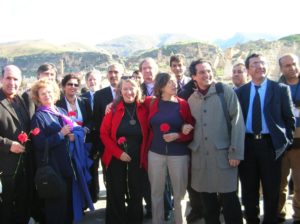
PEN trip to ancient town of Hasenkeyf, Turkey, 2005 including PEN International and Turkish and Kurdish members
One of the highlights of the conference was a visit to Hasankeyf, reputed to be the oldest continuing settlement on the planet and a cradle of civilization. Built into the sandstone cliffs in southeast Turkey, Hasankeyf had yielded relics that dated the site even earlier than the 12,000 years recorded, perhaps as old as 15,000 years. This Kurdish town of southeast Anatolia was threatened by a dam the Turkish government planned to build on the Tigris River. The Ilisu Dam would drown the town as the water was diverted and eventually would submerge Hasankeyf under as much as 400 feet of water.
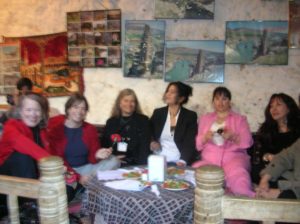
Lunch in a cave in Hasenkeyf, 2005, including PEN International representatives Joanne Leedom-Ackerman, Jane Spender and Lucina Kathmann
As we journeyed up the stone steps to the ruins of Hasankeyf Castle and later as we ate lunch in a cave, then bought small souvenirs from children who lived in the town, our delegation fell in love with the setting and the people. Several of us returned home and began writing about Hasankeyf in an effort to preserve its heritage. We were not alone. Worldwide protests to save this ancient site had been lodged, and the dam had been delayed. I set a google alert so that every time there was mention of the Ilisu Dam, I would know. Lucina Kathmann and I began exchanging latest news.
In spite of worldwide protests, the giant Ilisu Dam was completed after many delays in July, 2019. It began to fill its reservoir, tapping water from the Tigris River and diverting it from Iraq. The rising water levels are now slowly submerging the town of Hasankeyf, flooding the area which had been settled for millennia. The population for the most part has had to move. The waters have risen 15 meters and continue to rise around 15 centimeters per day, according to a February report by Reuters.
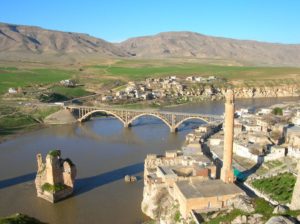
Hasenkeyf, Turkey, March 2005 during PEN Conference on Cultural Diversity, before the Ilisu Dam flooded the region.
Turkey’s rapprochement with the Kurds has also taken a turn away from the opening and the cultural diversity we celebrated in the 2005 Diyarbakir Seminar. But literature was exchanged there; friendships were made, and the dialogue among PEN members continues. Individual by individual has always been the strength and the modus operandi of PEN.
Next Installment: PEN Journey 35: Turkey Again: Global Right to Free Expression
PEN Journey 30: Barcelona: A Surprise
PEN International celebrates its Centenary in 2021. I’ve been active in PEN for more than 30 years in various positions and now as an International Vice President Emeritus. With memories stirring and file drawers of documents and correspondence bulging, I am a bit of a walking archive and have been asked by PEN International to write down memories. I hope this personal PEN journey will be of interest.
I was having lunch with my husband at a Georgetown restaurant in Washington, DC on a Saturday in May, 2004. I was due to fly out the next day for Barcelona to attend International PEN Writers in Prison Committee’s 5th biennial conference, part of a larger Cultural Forum Barcelona 2004. My husband and I were talking about our sons—the oldest was getting a PhD in mathematics and was also training for the 2004 Olympics as a wrestler, hoping to make the British team. (He had dual citizenship.) The younger, recently graduated with an advanced degree in International Relations, had just deployed to Iraq as a Marine 2nd Lieutenant and was heading into a region where the war was over but the insurgency had begun. It was an intense time for our family, yet as parents there was not much we could do except to be there, cheering for our oldest at his competitions and writing letters and sending packages and prayers for our youngest. It was a time when as parents we realized our children had grown beyond us and were taking the world on their own terms.
I was planning to be away for the week in Barcelona where PEN members from around the world were gathering for the Writers in Prison Committee (WiPC) and Exile Network meetings. Carles Torner, PEN International board member, chair of PEN’s Translation and Linguistic Rights Committee and former President of Catalan PEN, had helped arrange International PEN’s participation and funding as part of the Universal Forum of Cultures—Barcelona 2004. This would be the largest WiPC conference to date with delegates from every continent and multiple speakers and side events.
Carles, a poet, fluent in PEN’s three official languages English, French and Spanish, was one of the highly respected, organized and talented PEN members. He’d also been involved in the years’ long reformation of PEN International. As members looked to who could be a strong replacement for the current International Secretary when Terry Carlbom’s term ended in a few months, there was widespread enthusiasm for Carles to stand for the office. I was among the enthusiasts.
My phone rang at that Saturday lunch. International PEN Board member Eric Lax, already in Barcelona for meetings, said he had news and a question; he told me he was calling on behalf of others as well. The news: the Catalan government had also recognized Carles’ talents and had offered him a position as Director of Literature and Humanities Division at Institut Ramon Llull to promote Catalan literature abroad. A father of three, Carles had accepted this paid position which meant he couldn’t stand for PEN International Secretary, an unpaid position. He wouldn’t have the time for both, and there would be conflicts of interest.
Eric asked if I would allow myself to be nominated. A number of members and centers, including the two American centers, were asking, he said. PEN’s Congress where the election would take place was only a few months away in September and nominations were due soon. I was flattered but said no for a number of reasons. Eric asked that I not answer yet, just come to Barcelona, talk with people and let them talk with me.
The International Secretary who worked with the Board and President to run International PEN was not a position I aspired to, but I agreed to come to Barcelona with an open mind. I’d worked with PEN in various roles, including as Chair of the Writers in Prison Committee, for over 20 years. I’d been both inside and outside the reform process that was going on. I understood, at least in part, what PEN was aiming towards and what it would take for this sprawling organization to operate competitively among nongovernmental organizations in the 21st century. I’d sat on boards of several global nonprofit organizations, including Human Rights Watch, Save the Children and the International Crisis Group.
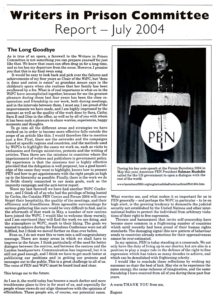
PEN Writers in Prison Committee Center to Center newsletter Spring, 2004
In Barcelona delegates from a number of PEN centers urged me to stand for the office. I asked whether they thought this was the time for an American to take on this leadership role given the controversy over US engagements. “We don’t think of you as American,” some said, perhaps because I’d also lived in Europe for six years during my work with PEN.
I kept my own personal life quiet as I always did, but I did share with Carles, who was urging me to stand, that I had a son in the Marines in Iraq and was committed to him. I didn’t want to get involved in political controversies over the war. “Your focus has always been on freedom of expression,” Carles reminded me. PEN was not an anti-war organization; its focus was on protecting freedom of expression for writers to agree or disagree on issues, not to take political positions unless relating to abuses of human rights.
Mike Roberts, PEN American Center’s Executive Director, was among those encouraging me to stand for the office. He said American PEN would support me however they could with help and advice. We both understood that the organizational models of many American nonprofit organizations could benefit PEN, including the need to have a paid executive director. There was much to be said for the culture of the volunteer which PEN operated in, but given how complex and widespread PEN’s work had grown, it was going to be more and more difficult to compete for funding if there was not a paid professional executive director in the international office in addition to the talented administrative staff and Board of PEN. Certain funders were already telling us as much. Case in point was that Carles, an experienced literary organizer with a family to support, simply could not afford to take on such a demanding position gratis. Eugene Schoulgin, chair of the Writers in Prison Committee, also encouraged me. I left Barcelona thinking deeply about standing for this position which would require significant time and travel.
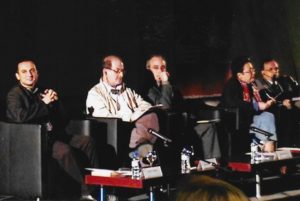
PEN Program at Cultural Forum Barcelona 2004. L to R: Carles Torner, International PEN Board Member and director for PEN conference, Salman Rushdie, President American PEN, Josep Bargalló, First Minister of Catalonia, Dolors Olier, President Catalan PEN
That question absorbs many of my personal memories about the Barcelona conference. I remember the impressive venue and the conversations with friends and colleagues and the many presentations, including by Anna Politkovskaya and an opening talk by Salman Rushdie, the new President of American PEN who called for the US government to open a wider dialogue with the world.
Fortunately, I have papers from the 2004 Writers in Prison Committee meetings. We met over five days and also joined public discussions on literature and memory and the responsibility of writers during times of war. The WiPC continued its focus on issues of impunity and the effect of anti-terror legislation on free expression as documented in PEN International’s two reports issued the previous year.
Joan Smith of English PEN reported that anti-terror legislation was having an impact with democratic countries reacting out of fear to the events of September 11 and either tightening existing legislation or implementing new legislation. Countries such as Cuba were taking advantage for as attention deflected from them, they were cracking down on more dissidents. Countries such as Uzbekistan and other Central Asian countries were using the war against terrorism to win support from the US and western Europe.
Müge Sökmen of Turkish PEN spoke of the danger of silencing dissident voices, a move that would lead to an increase in state terrorism. Since the 9/11 attacks in the US there had been a 20% increase in the number of imprisoned writers. The lifting of Article 8 of the Turkish Anti-Terror Law was welcomed but was in the context of Turkey’s bid for acceptance into the European Union.
Ragip Zarakolu, a Turkish publisher, and Martxelo Otamendi, director of a Basque newspaper, reported to the meeting on their experiences of repression and imprisonment under the anti-terror laws.
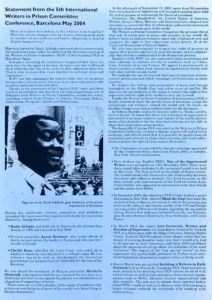
Report on 5th International PEN Writers in Prison Committee Conference as part of Barcelona Forum 2004, including preliminary meetings in London, New York, Istanbul and Ottawa.
Nigerian writer and journalist Kunle Ajibade, who had been sentenced to life imprisonment in 1995 for “conspiring to overthrow the government,” had been freed in 1998 in part because of PEN’s work. But he told the group, “Many of us have been asking, is this what we went to jail for? What has all our struggle come to? A mere clearing of the path for another set of murderers and looters? Right now, a cloud of despair hangs over us.”
Ali Lmrabet, Moroccan journalist, who had been sentenced to three years for insulting the King, also spoke. However, Cheikh Kone, a journalist from the Ivory Coast who’d fled to Australia, had been denied a visa to Spain and so an empty chair was placed at the speaker’s table. Kone had been detained since 2001 in a refugee camp in Australia and was finally released in July 2003 after PEN’s campaign, but the Australian government had invoiced him for $89,000 for the cost of his detention.
Aaron Berhane, an Eritrean journalist who fled to Canada in 2002 reported his situation and the help International PEN’s WiPC and Canadian PEN had given through the Writers in Exile Network. The Network, started in 1994, was currently chaired by PEN Canada and included PEN centers in Austria, Switzerland, Sweden, Norway, England, USA West, and Germany and had helped exiles from Cuba, Sierra Leone and other countries.
A panel with representatives from OSCE, UNESCO, the UN Human Rights Commission, the International Publishers Association (IPA), and the International Freedom of Expression Exchange (IFEX) gathered with PEN to explore cooperation and joint work around issues of freedom of the media, including campaigns on individual cases and pressure on countries to change their laws to conform to democratic standards.
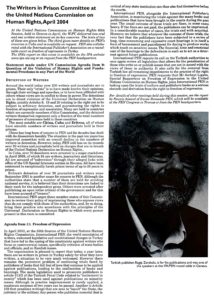
Report on PEN Writers in Prison Committee statement to UN Commission of Human Rights, April, 2004
Ambeyi Ligabo, Rapporteur on Freedom of Expression in the office of the UN Commissioner on Human Rights said he believed the two new threats to freedom and liberty were terrorism and anti-terrorism legislation. He was concerned that countries such as Denmark which professed to be a beacon of democracy were actually denying liberties to their citizens. He was concerned that legislation introduced in some African countries had undermined the progress human rights campaigners had achieved, and he urged collaborative efforts in fighting new threats to free expression.
The WiPC Steering Committee, which consisted of representatives from ten PEN centers, presented its report with suggestions for WiPC headquarters and for the PEN centers on how to expand PEN’s work, its outreach, its funding and its cooperation. A three-year plan was adopted.
The final work of the WIPC conference was an agreement on a campaign calendar for 2004-2005 with an over-arching theme on the issue of Freedom of Expression and Anti-Terrorism.
In accepting PEN’s WiPC statement on freedom of expression from the conference whose theme was “The Value of the Word,” Catalonia’s Minister of Culture declared: “The word is an inspiration for the imagination, a means for peace and a vehicle for freedom. Literature and the word must always be above conflict. PEN has been in the forefront in the fight to secure the value of the word. The value of the word is a guarantee for a better world and more necessary than ever.”
It was agreed the next WiPC Conference would be held in Istanbul in 2006, hosted by Turkish PEN.
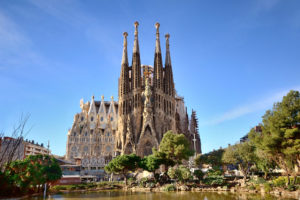
La Sagrada Familia—Gaudi Cathedral—in Barcelona, Spain
Before I left Barcelona, I went to visit the Gaudi Cathedral (La Sagrada Familia) which I’d first seen at PEN’s 1992 Barcelona Congress where I’d been so impressed by its majesty and complexity, I wanted to return. Architect Antoni Gaudi had originally planned a cathedral with 18 Gothic spires, but he got hit and killed by a trolley before his elaborate design was realized. Over 100 years later, the cathedral was still unfinished. Gaudi had applied for a construction permit in 1885 but no one ever answered. (It took the city 137 years before a building permit was finally issued in 2019, along with a $5.2 million fee.)
Gaudi defined architecture as the “ordering of light” so that the sun shined differently on the cathedral stones at each moment of the day, producing the myriad effects of light. In the intervening years others had worked to complete Gaudi’s design, but the cathedral remained unfinished. It was nonetheless a magnificent architectural achievement, a harmony or even disharmony of hundreds/thousands of artisans over the century who created this living work of art. I stood in an open space and stared up at the sky.
Next Installment: PEN Journey 31: Tromsø, Norway: Northern Lights
PEN Journey 27: San Miguel de Allende and Other Destinations—PEN’s Work Between Congresses
PEN International celebrates its Centenary in 2021. I’ve been active in PEN for more than 30 years in various positions and now as an International Vice President Emeritus. With memories stirring and file drawers of documents and correspondence bulging, I am a bit of a walking archive and have been asked by PEN International to write down memories. I hope this personal PEN journey will be of interest.
Over the years I’ve used various metaphors to describe PEN International—a giant wheel with 140+ spokes that reach out into the corners of the globe. A vast orchestra with the string, woodwind, brass and percussion sections scattered across the map, directed by local conductors and the Secretariat in London.
PEN’s core is an idea, codified in its Charter, acted upon by writers around the world organized into PEN centers. These writers and centers gather intensity as they work together.
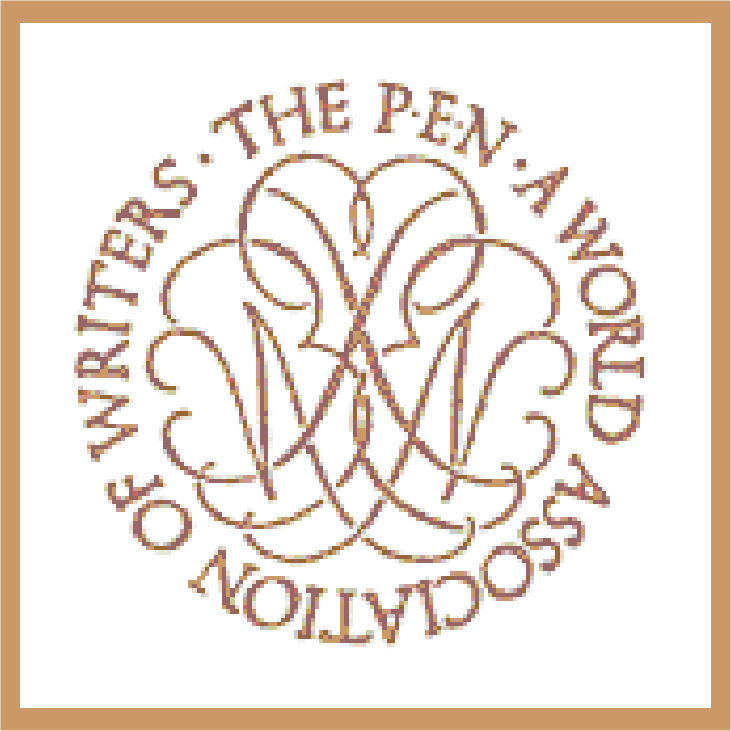
PEN International logo in 2002
Writers in a country or region or language are empowered to work as a center of PEN by the whole body of centers—the Assembly of Delegates—which vote on a center’s membership at PEN’s annual Congresses. During the months in between, PEN centers act both individually and collectively—celebrating and presenting literature in the many cultures and languages, mobilizing on issues of freedom of expression, acting to preserve and celebrate languages and translation, in particular minority languages, discussing and debating issues of peace, addressing the situation of women writers, and assisting and protecting writers who find themselves in exile. All of this activity between the annual Congresses occurs in the PEN centers and in the work of PEN International’s standing committees and at regional conferences which convene during the year.
I take a moment here to set out this template because in the PEN Journeys I’ve been focusing in large part on PEN’s annual Congresses. Yet the heart and soul of the organization resides in its centers and the individual members, most of whom never attend a PEN International Congress.
Some centers host the meetings of PEN’s standing committees. Slovene PEN has long hosted the annual Peace Committee meeting in Bled, Slovenia (PEN Journey 14). Until recently Macedonian and Catalan PEN have alternated hosting the Translation and Linguistic Rights Committee’s annual meetings either in Ohrid or Barcelona. The Women’s Committee set a new paradigm when it formed in 1991 by rotating its chair to different regions of the world and hosting its meetings there though recently because of costs, the Women’s Committee has held its meetings along with other committees, usually with the Peace Committee in Bled. As I’ve written in earlier posts (Journey 17 and 23) the Writers in Prison Committee began holding a biennial meeting in 1996, hosted by different PEN Centers. In recent years to share costs, the Writers in Prison Committee (WIPC) has teamed up with ICORN (International Cities of Refuge Network) to hold its biennial meeting in different countries. The recent 2018 WIPC meeting was held aboard a docked cruise ship in the Rotterdam Harbor.
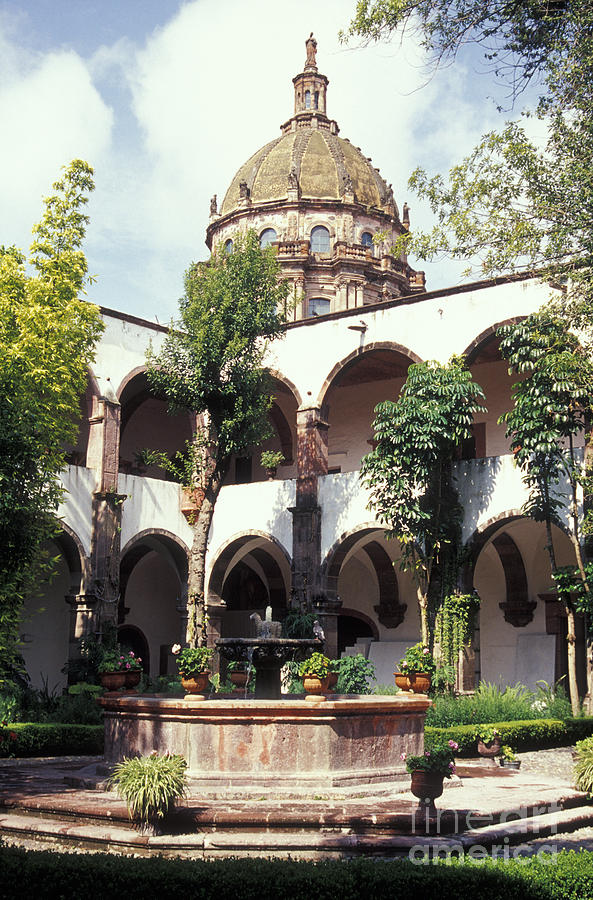
Bellas Artes Center, San Miguel de Allende, site of PEN WIPC conference, November 2002
In November 2002 the fourth WIPC meeting gathered in San Miguel de Allende, hosted by the PEN Center there in the charming old colonial town 170 miles from Mexico City where the 2003 PEN Congress would convene the following year. Forty-three PEN members from 25 centers from six continents gathered at the Bellas Artes center for a three-day conference followed by a meeting of the PEN Americas Regional Conference with the Latin American PEN Centers.
At the Bellas Artes center, originally the cloister of a convent, and in the Teatro del Artes PEN members met in workshops to review sources and methods as related to the threats of terrorism and anti-terror laws to freedom of expression, to review campaign techniques, PEN’s work at the United Nations, missions, regional networks, exile and asylum issues, borderline cases and finally strategies for the future. PEN’s WIPC set out to research a report in consultation with other organizations on the effect of anti-terrorism measures worldwide on freedom of expression, a report that would be presented at the 2003 PEN Congress.
In San Miguel PEN’s WIPC launched a report and a campaign “Freedom of Expression and Impunity Campaign” with an epigraph from Helen Mack, sister of anthropologist Myrna Mack, who was murdered in 1990 on orders carried out by the Guatemalan military. Helen Mack wrote:
Through my experience as co-plaintiff in the on-going trial to resolve the murder of my sister, Myrna Mack, I have seen impunity up close, along every step of this tortuous path in search of justice. I have felt it when essential information has been denied that would determine individual criminal responsibility; when judges and witnesses have been threatened; when the lawyers for the accused military officials use the same constitutional guarantees of due process in order to obstruct judicial procedures; and when my family, my lawyers, my colleagues and I have been threatened or been victims of campaigns to discredit us. In every action that is oriented toward generating impunity, one can clearly see the hand of agents of the State who use the same judicial and security institutions to pervert, once again, the goal of reparation through judicial means as well as the right to the truth and to justice.
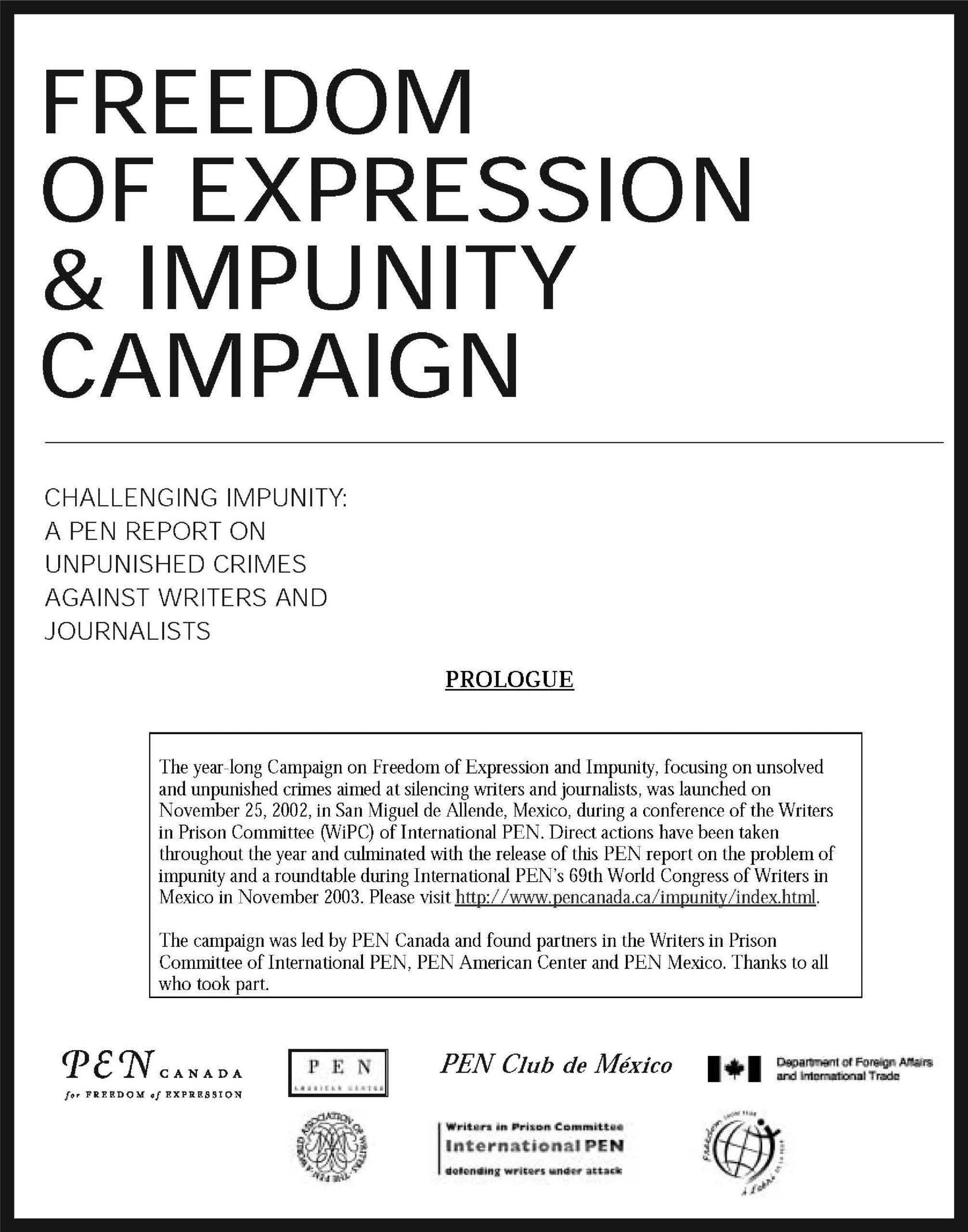
PEN International Impunity Report, launched at 2002 WIPC Conference, San Miguel de Allende
The Impunity report focused on Colombia, Iran, Mexico, Philippines, and Russia but PEN’s ongoing campaign targeted the issue wherever it occurred in the world.
Addressing the 2002 WIPC Conference and the Latin American Network was Brigadier General José Gallardo Rodriguez. At the Macedonian Congress earlier in the year PEN International President Homero Aridjis had reported on General Gallardo’s release. “Last February, I was invited to testify on behalf of PEN on General José Francisco Gallardo’s case, as one of three witnesses scheduled to appear before the Inter-American Court on Human Rights at a hearing in Costa Rica,” Homero said. “A few days before the hearing at which the Mexican Government was ordered to appear, he [Gallardo] was unexpectedly pardoned and released from jail, nine years after his arrest and imprisonment following the publication in the magazine Forum of an excerpt of his masters’ thesis about the need for a military ombudsman in Mexico. General Gallardo’s release was an important victory for freedom of speech and a significant advance of justice in Mexico. PEN Centers worldwide who defended Gallardo’s cause for eight years now celebrate the liberation of a Mexican Dreyfus.”
General Gallardo thanked International PEN for its invaluable support for having campaigned on his behalf, and he assured that he would continue to press for the creation of a military ombudsman.
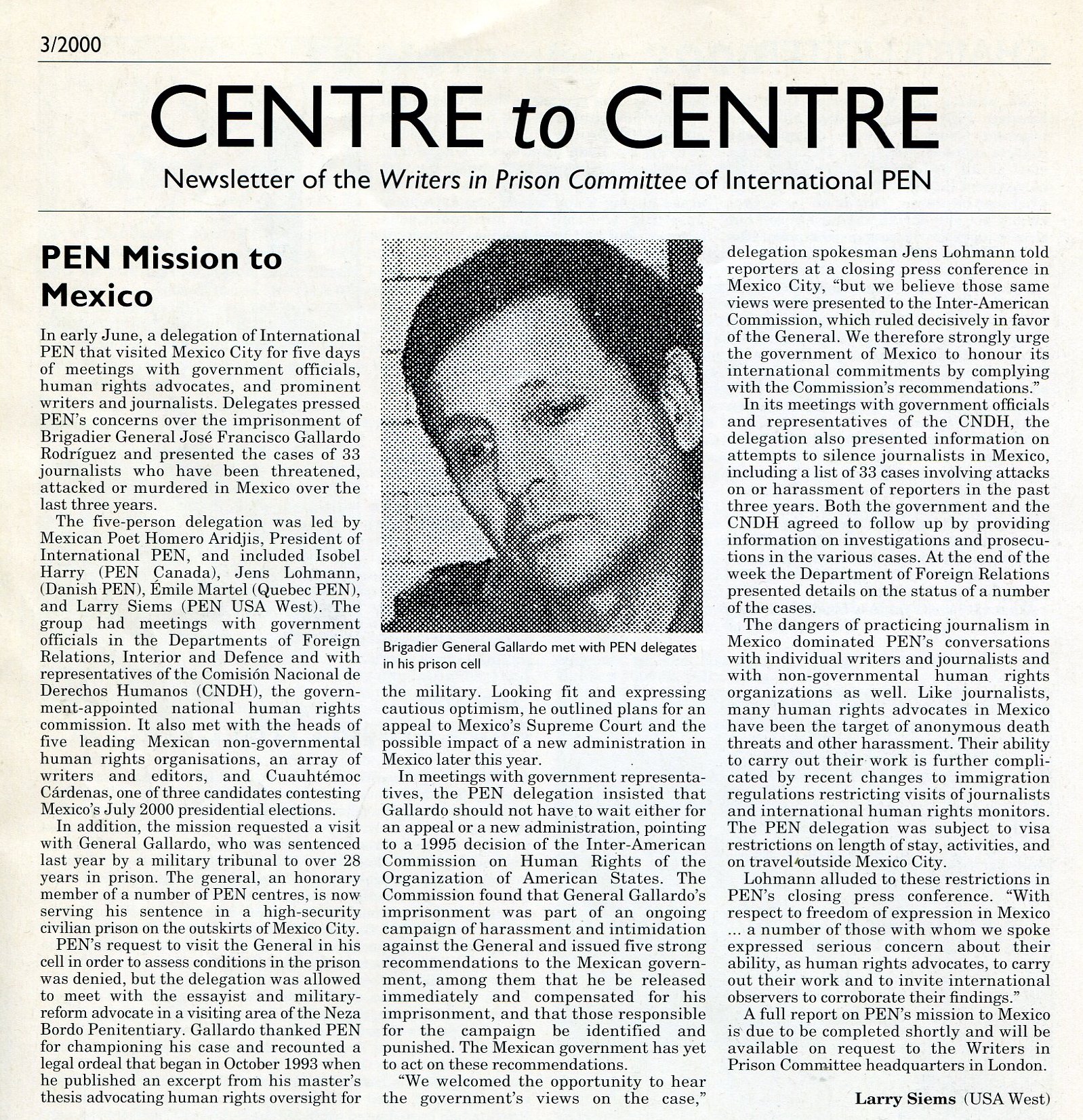
PEN WIPC newsletter 2000 on case of General José Gallardo Rodriguez
The Special Rapporteur on Freedom of Expression for the Organization of American States also participated on a panel on Corruption and the Writer, focusing on the problem of impunity, its link to corruption, its effect on free speech and the role of the writer in combating these problems.
Noting the increasing workload of the WIPC and the fact that the staff and budget had not grown at the same rate, several members suggested a Steering Committee of five individuals/centers be formed to assist the WIPC headquarters and work directly with committee chair Eugene Schoulgin and the WiPC staff led by Sara Whyatt. This group would formulate a strategy for the next three years, help define priorities and address the resources needed to achieve the goals. The proposal was accepted, and Isobel Harry (Canadian PEN), Archana Singh Karki (Nepal PEN), Jens Lohmann (Danish PEN), Lucy Popescu (English PEN) and Larry Siems (American PEN) formed the Planning Group. Their goal was to produce with the staff a plan that would be vetted by all WiPC members and approved at the Mexico Congress.
At the same time PEN International as a whole was undergoing a major strategic planning process. As the century turned, PEN International was in the midst of restructuring itself both to develop a more democratic governance system and also to address its rapid growth and funding challenges. In this process American PEN was an important actor, along with the Scandinavian and Japanese centers. American PEN, located in New York, was the largest of PEN’s centers and contributed more dues than any other center, but it had not hosted an International Congress since 1986 and did not host any of the international conferences or committee meetings. It had launched a World Voices Festival after 9/11 to bring international writers to the U.S. but this was an American PEN, not an International PEN, activity. However, with the assistance of two former American PEN presidents—Edmund (Mike) Keeley and Michael Scammell and American PEN Executive Director Michael Roberts and former PEN USA West President and International PEN Board member Eric Lax, the American contingent stepped up to raise funds from American foundations, including the Mellon Foundation and the Rockefeller Foundation to assist International PEN in a major strategic planning initiative. This consisted of several preliminary conferences in London and a final gathering at the Rockefeller estate in Bellagio, Italy.
The Americans, particularly Mike Roberts, PEN America’s Executive Director, understood that American PEN was only as strong as the whole body of PEN which at the moment had a very small hub or Secretariat for a very large wheel of 140 spokes. The core needed strengthening both structurally and financially. International Secretary Terry Carlbom, International PEN President Homero Aridjis, Deputy Vice Chair of the Board Carles Torner and the whole Board of PEN International, along with members of the board of the PEN International Foundation, Standing Committee Chairs, and several Vice Presidents agreed and committed to the strategic planning process.
During the last decades PEN had depended on funds from its centers and from UNESCO and from SIDA, the Swedish Development Association and a few other funders, but the world was changing and with it the sources of funding. U.N. organizations like UNESCO were under siege. Government funding for European and East European cultural organizations was evaporating; the same was true for other PEN centers. The challenge for PEN was structural and financial. No one knew what the 21st century would bring, but most everyone understood it would not be the same.
Next Installment: PEN Journey 28: Bellagio: Looking Forward—PEN for the 21st Century
PEN Journey 26: Macedonia—Old and New Millennium
PEN International celebrates its Centenary in 2021. I’ve been active in PEN for more than 30 years in various positions and now as an International Vice President Emeritus. With memories stirring and file drawers of documents and correspondence bulging, I am a bit of a walking archive and have been asked by PEN International to write down memories. I hope this personal PEN journey will be of interest.
I remember diving from a rowboat into Lake Ohrid and swimming in pristine water. I love to swim but never did so at PEN Congresses. However, the 68th Congress was held on one of Europe’s oldest—3 million years old—and deepest lakes which floated in the mountainous region between North Macedonia and eastern Albania. The water was the cleanest I had ever seen or felt. I swam without looking back until finally, I heard a voice from the boat shouting, “Come back! You’re almost in Albania!”

Moments before Isobel Harry (l) (Canadian PEN) and Joanne Leedom-Ackerman (r) (American PEN) dive into Lake Ohrid for a swim between meetings at the 68th PEN Congress in Ohrid, Macedonia in 2002
Albania, or rather the Albanian Liberation Army, a paramilitary organization, had recently been in conflict in Macedonia and was the reason PEN’s Congress there had been postponed the year before. (PEN Journey 25)
Swimming with me was my friend Isobel Harry, Executive Director of Canadian PEN, and in the boat sat Cecilia Balcazar from Colombian PEN and another PEN member. They watched over us in this break from the PEN meetings. My memories of the 2002 PEN Macedonia Congress include intense meetings of the Assembly in the Congress Hall of the old Soviet-style Metropol Hotel and neighboring Bellevue Hotel conference center and relaxed gatherings afterwards at lakeside cafes in the town of Ohrid, a UNESCO World Heritage site.
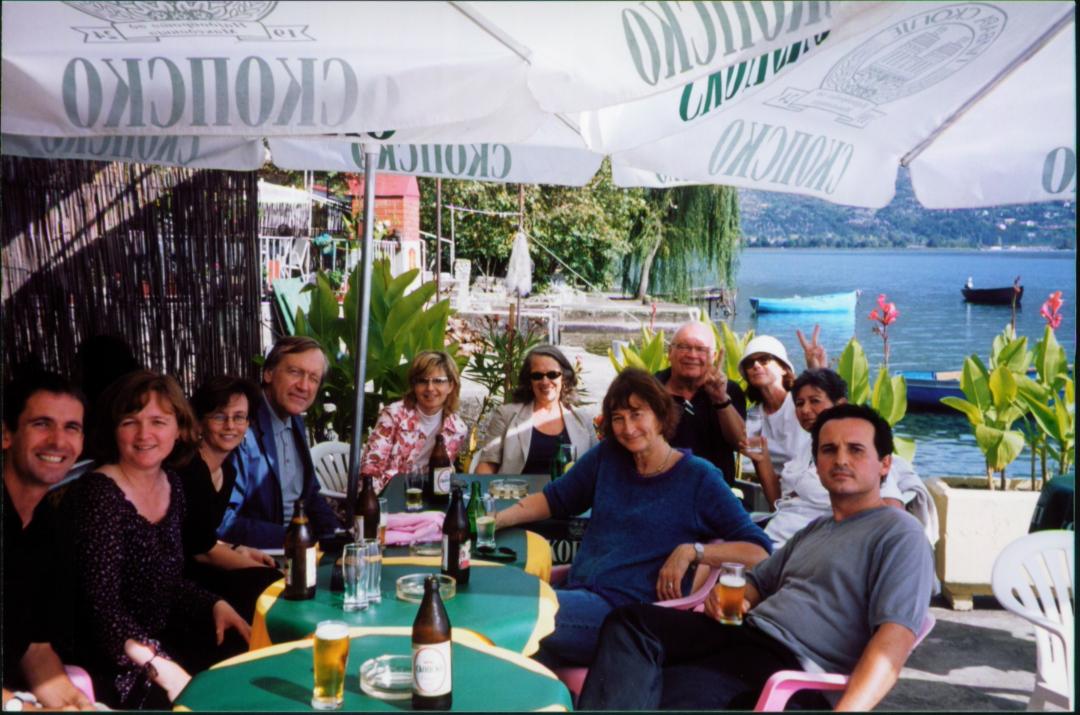
PEN colleagues at a lakeside cafe during the PEN Congress in Ohrid, Macedonia. (L to R) Dixie Willis and Sara Whyatt (WiPC staff), Susie Nicklin (English PEN), Eugene Schoulgin (Norweigan PEN & WiPC Chair), PEN member, Joanne Leedom-Ackerman (Vice President & American PEN), Niels Barfoed (Danish PEN), Isobel Harry (Canadian PEN), Fawzia Assaad (Swiss Romand PEN), Victoria Glendinning (English PEN), Carles Torner (PEN Board & Catalan PEN)
In the evenings we gathered for literary events with UNESCO-like titles—The Future of Language/Language of the Future and Borders of Freedom/Freedom of Borders. These were also the themes of the Congress. There was music and poetry in Macedonian and other languages I didn’t understand, recited in cavernous, shadowy chambers, including in the ancient Cathedral Church of St. Sophia, a structure from medieval times, rebuilt in the 10th century. Its frescoes still adorned the walls from Byzantine times in the 11th, 12th and 13th centuries and had been restored after the church was converted to a mosque during the Ottoman Empire.
While current politics and conflicts occupied the daytime work of PEN, history suffused the gathering. Civilization in Ohrid dated to 353 BC when the town had been known as “the city of light.”

Cathedral Church of St. Sophia in Ohrid
“The old millennium, especially in ‘old’ Europe, should, I believe, be left behind with all its anachronistic boundaries—geographical, historical, racial, ethnic, state, linguistic, religious and cultural—and give way to the unfolding of the new millennium, to its open-mindedness and tolerance,” Dimitar Baševski, President of Macedonian PEN, wrote in his introduction to the Congress. “For generations we in Macedonia have lived with a creed according to which culture and not warfare or power is perceived as the field for competitiveness among nations. The aims of the World Congress of International P.E.N. in 2002 perfectly correspond with the spirit of this creed.”
Over 300 people from 69 PEN Centers gathered in the hills of this North Macedonian city for the 68th World Congress. The Congress’ work included the activities and reports of PEN’s committees—Writers in Prison, Peace, Translation and Linguistic Rights, Women’s, Exile Network—and the PEN Foundation, PEN International Magazine, and PEN Emergency Fund. There was a proposed revision to PEN’s Charter removing the concept of literature as being national in origin; there was the introduction of new centers, the dissolution of inactive centers and the elections for the Board, Vice Presidents, and Search Committee. There was a report from the International Secretary on the renewal of PEN’s “formal consultative relations” with UNESCO for a further six years, a step that acknowledged PEN as the only voluntary organization and the only literary organization in this category and one of only 12 organizations with a “Framework Agreement.” PEN had also been reclassified as a Category II organization with ECOSOC (United Nations Economic and Social Council) which included organizations with “special competence in specific areas” such as Amnesty and Human Rights Watch, a category that reflected PEN’s status and contribution as the only world writers organization within the UN system. At PEN’s Assembly of Delegates attention was called to a dozen PEN conferences—last year’s and the year ahead—and finally the Assembly passed Resolutions from the Writers in Prison Committee and Peace Committee on the situations in Russia and Chechnya, Russia itself, the Middle East, Belorussia, China, Colombia, Cuba, Iran, Turkey, Zimbabwe, Uighur Writers, and Tatarstan
The aftermath of the 9/11 attacks on the United States the year before remained a focus that was altering the security landscape for nations around the world and for writers. PEN President Homero Aridjis observed, “Today our world is teetering on the brink of war.” He added, “In search of security, there have been encroachments on privacy and intrusive measures threatening freedom of expression and the right to dissent and criticize, but the global reach of information seems to have accelerated, proof of which is the current effort by the Chinese government to block its citizens’ access to the search-engine Google.”
“How can PEN and writers bring about positive changes?” he asked. “For a start, we could promote freedom of expression in Afghanistan. Not that long ago we were signing Internet petitions protesting against the treatment of women by the inhumane Taliban regime and begging the Taliban not to dynamite the colossal Buddhas of Bamiyan. Now I ask you to help me identify and approach Afghani writers who would be willing to found a PEN Center in Afghanistan and to try and find ways of giving this fledgling Center the means to thrive.”
[With the help of Norwegian PEN and others, an Afghan PEN Center was in fact founded with men and women writers from all ethnic groups and was voted into PEN at the 69th Congress the following year in Mexico. Writers in Prison Committee Chair Eugene Schoulgin played an instrumental role in working with and facilitating support for the Afghan writers.]
At the Macedonia Congress Eugene reported, “In my speech in London last November I mentioned the threats to the freedom of expression I feared that would follow the events of 9/11 in the US. What has happened last year has unfortunately proved these fears were well founded. Today over 40 countries have imposed new legislation on their populations which clearly weaken their human rights. New Anti-terror laws have been established in Canada, USA, UK, France, EU as a whole, Jordan, India and New Zealand. Terrorism laws expanded on Cuba and on Italy and in Colombia, Egypt, Zimbabwe, Israel, Russia, Uzbekistan, China and in the Philippines, and terror laws have been used as an excuse to crack down on the opposition and on minorities inside their regions. This in combination with the threats of a new war on Iraq makes the present situation extremely worrying, and will most certainly give us in the WiPC reason to be even more vigilant in the year to come.”
Visiting the WiPC Committee at the Congress were two former PEN main cases—Eşber Yağmurdereli, Turkish poet/dramatist and lawyer, who was blind and spent 14 years in prison and whom a number of us had met in Istanbul at a Freedom of Expression Initiative a few years before and Flora Brovina, a Kosovair/Albanian poet and doctor who had been abducted by Serbian troops and imprisoned in Belgrade during the NATO bombing. Flora’s son had contacted PEN which sent out an urgent appeal about her abduction. I had met her husband and family when I visited Pristina, Kosovo the year before with the International Crisis Group while she was still in prison. This was the first time I met Flora, who had become an internationally celebrated case and was a member the country’s Assembly. She told the Writers in Prison Committee that every letter sent to the prison by PEN served as another attempt to tear down the walls of the prison.
Esber Yagmurdereli said at present there were around 10,000 prisoners accused of being “terrorists,” but 90% of these should be considered prisoners of conscience, and many were simply students. “On 19 December 2000, the 20th day of the protest, I was playing chess with my friend in my cell,” he said. “He was a university student named Irfan. He was my son’s age–21 or 23 years old. He defeated me three tims. He said you are 60 years old. There are so many of us whose cases ar not covered in the press, but you do get attention. We need you as much as you need us. Then came the teargas. The protests took three yours. I myself lost consciousness and came to about an hour later. I learned that 32 people had been killed–burned to death. I learned that my friend Irfan was one of them.”
Russian journalist Anna Politkovskya also attended the Macedonian Congress. She told the WIPC meeting that she got threats from criminals, military and government. “I could stay in Vienna or elsewhere in the West, but it is my decision to be in Russia because I understand more than other people that if I couldn’t write articles or give radio talks, there would be no information about Chechnya,” she said. “Because travel to Chechnya is illegal, I need to prepare my trips as if I were a spy. I have to be strong, as far as I can. My children are in Moscow, and they are also threatened. ” My last meeting with Anna was sharing thick coffee at a tiny airport café in Skopje on our way home from the Congress.
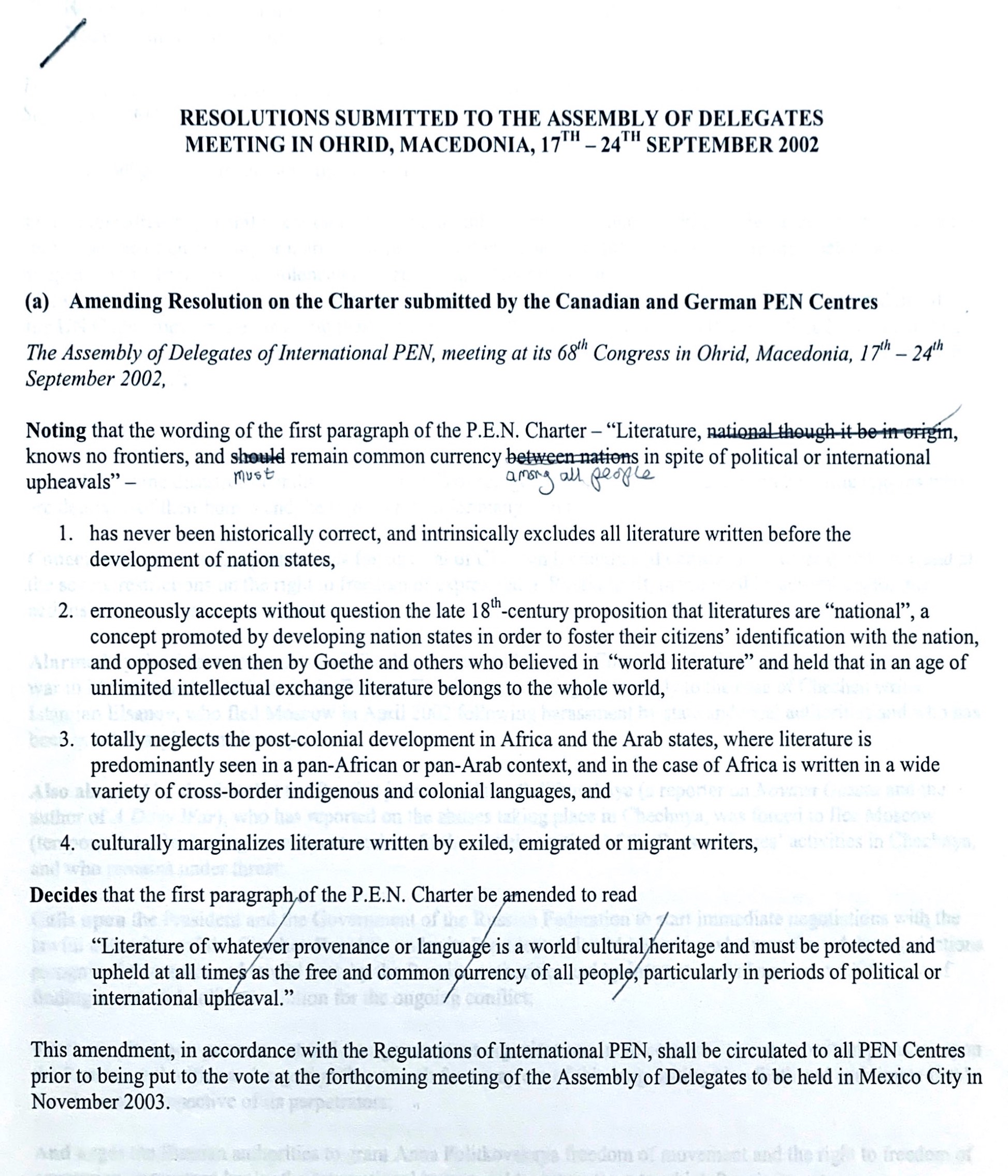
Resolution for change in wording of PEN’s Charter; amended wording, noted and approved, proposed by English PEN president Victoria Glendinning. Final proposal and approval to take place at Mexico Congress in 2003.
In addition to its traditional work, International PEN was proceeding with modernizing its governance and structure, led by International Secretary Terry Carlbom and the Board of PEN. Deputy Vice Chair of the Board Carles Torner reported that this included the restructuring of PEN and the PEN Foundation as British charitable tax law was changing; also new roles for the Vice Presidents were being considered; a modest change in the Charter was proposed for this Assembly to be confirmed at the next year’s Congress in Mexico, and the Treasurer was proposing a new international dues structure with a graded system, raising dues for centers from wealthier economies and reducing dues for others, based on the World Bank system of four categories. The change in the dues structure was unanimously approved.
Elections at the Congress included two new Vice Presidents Lucina Kathmann (San Miguel Allende PEN) and Boris Novak (Slovene PEN) and new Board members Takeaki Hori (Japan PEN), Cecilia Balcazar (Colombian PEN), Sibila Petlevski (Croatian PEN) and Elisabeth Nordgren (Finnish PEN).
“We are at the end of the first mandate of the first Board elected three years ago during the Warsaw Congress under the new Regulations.” Carles reported. “…we now have a real capacity for collective decision-making between Congresses…we are noticing that the transformation we dreamed of six years ago, when the new structuring of International PEN started, has taken place. There are more people involved in the work of International PEN, and each person represents a specific sensitivity within our international community…and we are better prepared to achieve our task now and in the future.”
The modernization and reform of governance also applied to PEN’s more than 130 centers with agreement that new centers from unrepresented parts of the world needed to be developed and centers that no longer functioned or worked in harmony with PEN’s Charter should be disbanded though there was often reluctance among PEN members to close a center.
At the Macedonia Congress, a particular PEN-like debate arose over the Langue d’Oc Center which no longer functioned. Langue d’Oc, or the Language of the Troubadours, was still spoken in a region in the South of France, in part of Italy and in one valley in Spain. The center’s president, whose name was the same as a great literary character, had worked on PEN’s Universal Declaration of Linguistic Rights with PEN’s Committee on Translation and Linguistic Rights half a dozen years before, and one member was still eager to keep the center going as a cause of minority languages. But the elderly outgoing President was not able to help, according to Jane Spender, PEN’s Administrative Director, who communicated or tried to communicate, with these centers. The center no longer functioned, had no office or contacts who replied, she reported. Before the center was declared closed, however, former International Secretary Alexander Blokh proposed that it be declared dormant and during the ensuing year French PEN writers who knew some of the members would “try to wake them up.” The Portuguese PEN delegate also offered to help as did the Esperanto, Slovene and Galician delegates. A similar lifeline was given to the inactive Welsh center by English PEN who agreed to perform the same role.
At PEN’s Congress the following year in Mexico, the interventions confirmed that after a year of dormancy neither center had rallied and so the Assembly voted to close the centers. In both cases new writers then came forward, and a few years later a new and active Welsh Center and Langue d’Oc Center formed and were elected back into PEN’s Assembly.
At the Macedonia Congress three brand new centers—Kyrghyz, Sierra Leone, and Tibet—joined the PEN family. It was in this fashion that PEN International pruned, renewed and broadened its base in civil society among nations and cultures and languages.
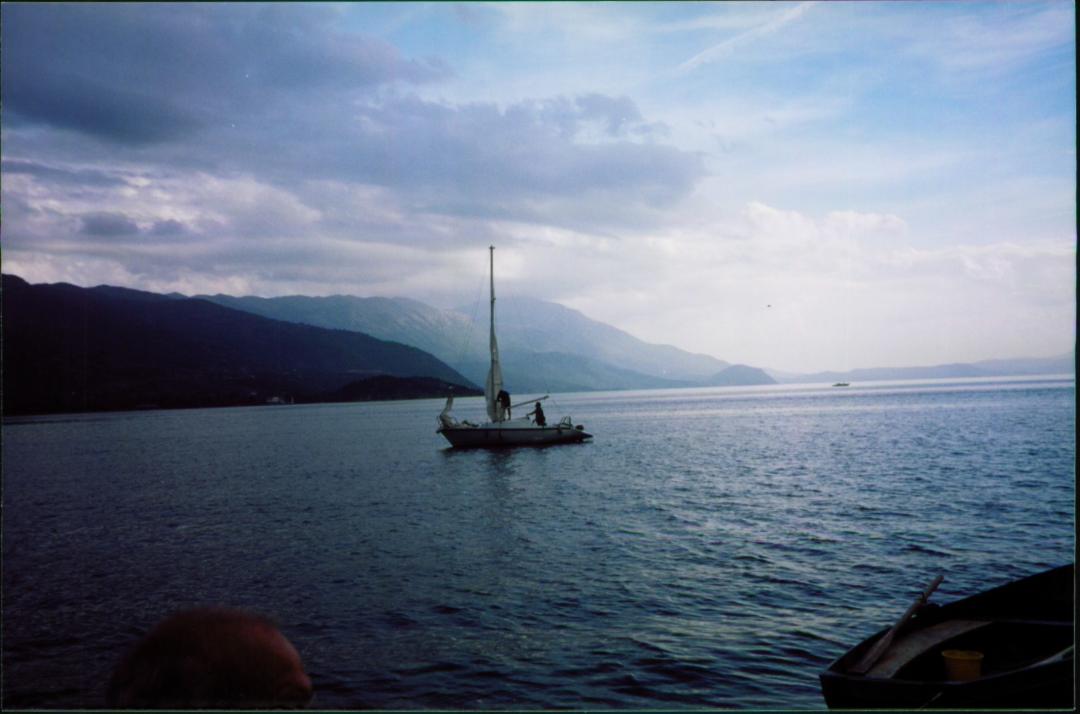
Lake Ohrid in the hills of North Macedonia between Macedonia and eastern Albania
Next Installment: PEN Journey 27: San Miguel Allende and Other Destinations–PEN’s Work Between Congresses
PEN Journey 13: PEN and the U.N. in a Changing World
PEN International celebrates its Centenary in 2021. I’ve been active in PEN for more than 30 years in various positions and now as an International Vice President Emeritus. With memories stirring and file drawers of documents and correspondence bulging, I am a bit of a walking archive and have been asked by PEN International to write down memories. I hope this personal PEN journey might be of interest.
We sat on one side of the dining table at the embassy in Geneva drinking orange Fanta—Sara Whyatt, Coordinator of PEN International’s Writers in Prison Committee (WiPC), Fawzia Assaad, member of Suisse Romand PEN and liaison for PEN at the UN Human Rights Commission, and myself, Chair of PEN International’s WiPC. On the other side of the table visibly sweating sat three diplomats from North Korea.
The week before, U.S. Secretary of State Warren Christopher had visited the same embassy. The United Nations Human Rights Commission was meeting in Geneva, and PEN, which had consultative status at the U.N., had sent us as representatives to the Commission meetings with targeted cases and country reports, including one on North Korea. The year 1994 was a time of potential thawing in relations with North Korea, and the diplomats on the other side of the table were telling us how they would like to have a PEN Center in North Korea.
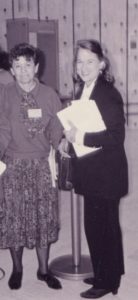
(l to r) Fawzia and Joanne at UN Human Rights Commission
Fawzia, who was ready to reach out to people, agreed that could be a possible step, but Sara and I gently nudged her under the table and explained that there were certain important criteria in a country for a PEN center to exist. The criteria included some measure of freedom of expression and an acknowledgement of this value though admittedly the extent of freedom varied in countries with PEN Centers. We asked if writers and their families who have been separated since the war might meet on neutral ground. The Counsellor answered, “Why not?” We asked if North Korea would open itself to visits by writers from abroad to discuss freedom of expression. The Counsellor again answered, “Why not?” We agreed that a first step could include an exchange of writers.
As the dinner and conversation proceeded, we all noticed the visible discomfort and sweat on the brows of the diplomats. We later speculated who might have been listening, perhaps on a device or behind the curtain on the other side of the table. Finally the young daughter of the senior diplomat was introduced to the room and entertained us on a traditional Korean musical instrument which she played as she sang Swiss folksongs.
The meeting was one of the more surreal in my tenure as Chair of PEN’s Writers in Prison Committee. None of our requests came to pass, and it wasn’t until almost two decades later in 2012 that PEN finally welcomed a North Korean PEN Center In Exile, whose members had managed to get out of North Korea with harrowing stories of escape. [Ref. JLA blog Sept. 2012]
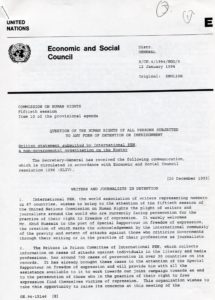
Page 1 PEN International’s submission on Detention and Imprisonment of Writers and Journalists to the UN Human Rights Commission
For the past 70 years, PEN International has maintained consultative status at the United Nations. This status has meant that PEN International’s reports and activities are both supported through UNESCO funding and are received and considered in UN forums, particularly at the UN Human Right Commission and in UNESCO.
After World War II UNESCO, whose mission was “building peace in the minds of men and women” through education, science and culture, looked to start organizations in these sectors. For theater and the arts it created the International Theatre Institute which creates platforms for the international exchange and engagement in the performing arts. However, when it came to creating an organization for literature, UNESCO recognized that PEN already existed, and so it has worked with and supported PEN congresses, conferences and programs around the world. These programs have also included the work of PEN’s Translation and Linguistic Rights Committee (TLRC) which developed the Universal Declaration of Linguistic Rights, also known as the Barcelona Declaration, passed by PEN in 1996 when the current Executive Director of PEN International Carles Torner chaired the TLRC.
Though PEN continues its relationship with the U.N., UNESCO’s budget has declined over the years as has its financial support and PEN’s dependency. PEN officials, including myself, have still visited UNESCO headquarters in Paris and UNESCO representatives still attend PEN conferences and congresses. But the change in both funding and governance for PEN International can be traced back to the years of the fin de siècle when governance around the world was challenged to include wider democratic vistas.
At PEN’s subsequent congress in Perth, Australia in 1995, conversations began regarding a change in governance for PEN, and by PEN’s 75th Anniversary in 1996 at the congress in Guadalajara, Mexico, the momentum for change became inexorable.
But first, meetings in Bled, Slovenia with the Peace Committee and further campaigns on writers threatened around the world.
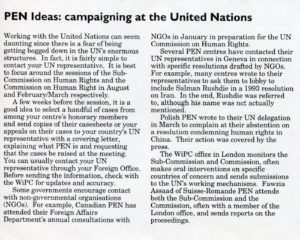
PEN Writers in Prison Committee Centre to Centre newsletter, Aug/Sept. 1994
Next Installment: PEN Journey 14: Speaking Out: PEN’s Peace Committee and Exile Network